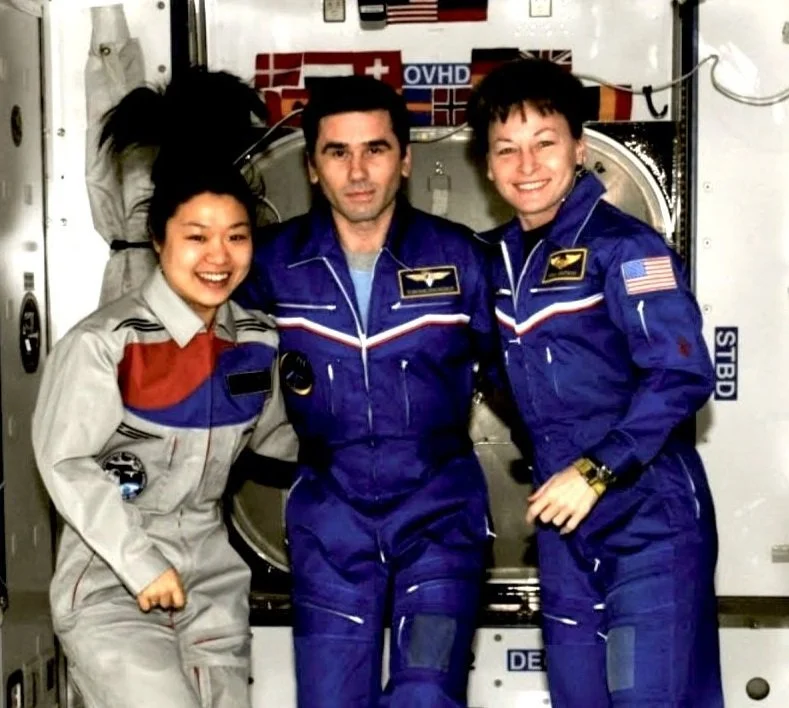Yi So-Yeon ︱The Ballistic Badass
South Korea’s first astronaut was a woman.
Yi So-yeon might know what it feels like to be an alien from outer space. At least that’s what a group of Khazakstani nomads assumed when the astronaut emerged from her space capsule after a ballistic re-entry in 2008.
Yi and her crew mates, Peggy Whitson and Yuri Malenchenko, survived the emergency landing when their Soyuz vehicle malfunctioned, forcing a “vomit comet” spin of about 500 kms per second. While most astronauts routinely tolerate gravitational forces up to 4 times stronger than Earth’s, this crew stomached a hefty 10g’s.
Lucky for Yi, she was offered useful advice while aboard the International Space Station ― throw up in the better smelling American-made vomit bags, but definitely wipe up with the much softer Russian toilet paper.
As South Korea’s first and only astronaut, Yi never had girlhood dreams nor die-hard ambitions to go to space. Nonetheless, she beat out the competition of 35,999 other South Korean applicants vying for the ride of a lifetime as a spaceflight participant ― the unassuming label that space agencies give to astronauts paid for by a private or public entity. In this case, Roscosmos got millions and the Republic of Korea got an astronaut program.
Talking to Yi is like hanging out with an old friend. She’s straightforward and down-to-Earth. In fact, she speculates that her self-ascribed laid-back attitude might be one reason she got the space gig of a lifetime.
Yi with Peggy Whitson and Yuri Malenchenko aboard the ISS.
“I was very curious about the selection process. Other candidates were trying hard to figure out different strategies, but my philosophy was I’ll just be authentic. If I’m the right person, they’ll pick me; and if I’m not the right person, they better not pick me. I don’t want to fake being an astronaut.”
Years later, she found out that some selection committee members questioned her mindset as too aloof for the risky business of spaceflight. Yet others decided that her low-key composure implied a kind of levelheadedness requisite to be selected as the back up astronaut for the final chosen prime candidate Ko San, a researcher at Samsung’s Advanced Institute of Technology. Yi and Ko trained together for 15 months in Moscow. But a month before blast off, Yi was bumped up to lead astronaut after Ko was caught violating security protocols. Apparently it’s a big no-no to remove reading materials from Roscomos’ Gagarin Cosmonaut Training Center.
On launch day in early April 2008, Yi was met by Valentina Tereshkova, the world’s first woman in space. Rumor had it that Tereshkova, who was not originally scheduled to make a guest appearance, rearranged her plans to attend lift off now that the Korean female candidate was destined for space. Tereshkova ― the superstar cosmonaut known to have cheekily urinated on vehicle equipment like her predecessor Yuri Gagarin just before her 1963 spaceflight ― was now by Yi’s side, gripping her anxiously like a concerned mother.
Launch day with the first woman in space, Valentina Tereshkova.
"You can see in the photo she’s not smiling at all ― just like my mom who couldn’t smile from the time I travelled to Russia until I returned from space."
While aboard the International Space Station, Yi conducted multiple science experiments for the Korea Aerospace Research Institute. As a PhD student of biotechnology at the time, Yi confessed that had been her plan all along.
"When I first read about the Korean Astronaut Program, I was ignorant about science in space. What caught my attention was the idea of doing experiments anywhere but at a boring university lab."
Besides monitoring mutations to the age-related genes of 1,000 fruit flies, Yi also measured changes to her own heart, eyes and facial morphology. After ten day stint in low gravity, Yi managed to stretch a whole 2 cm longer as is common for younger astronauts, who ironically suffer more skeletal pain upon their return to Earth as compared to elder astronauts who grow on average a mere 2 mm.
Back on Earth, Yi got to follow up with those microgravity experiments, securing a research position with the Korean Aerospace Research Institute, and extending de facto the Korean Astronaut Program. She officially resigned as South Korea’s space ambassador in 2014 and joined her husband to the US, where she eventually earned her MBA from the University of California, Berkeley.
As an exclusive member of the Association of Space Explorers ― open only to persons who have completed at least one orbit of Earth in a spacecraft ― Yi makes a point of staying in touch with her astronaut chums.
"I have lots of first names of women astronauts in my phone that I can call up whenever. I think the women astronauts, as compared to the men, tend to stick together. We’re more open and available for each other."
It’s not surprising that women astronauts might feel a more cohesive camaraderie, when they represented only 11% astronauts who have been to space.
Today, Yi is a managing director of business relations for a biotech company that develops accessible healthcare diagnostics, particularly for resource-limited medical facilities in rural areas around the globe.
Of course, there are other challenging environments where innovative medical diagnostics might be needed in the future.
And perhaps that’s been Yi’s plan all along? It’s not an absurd assumption about the unabashed astronaut who sang Sinatra’s Fly Me to the Moon to a world spinning below hundreds of miles from the International Space Station.
Yi So-Yeon sings Frank Sinatra’s Fly Me to the Moon aboard the ISS.



